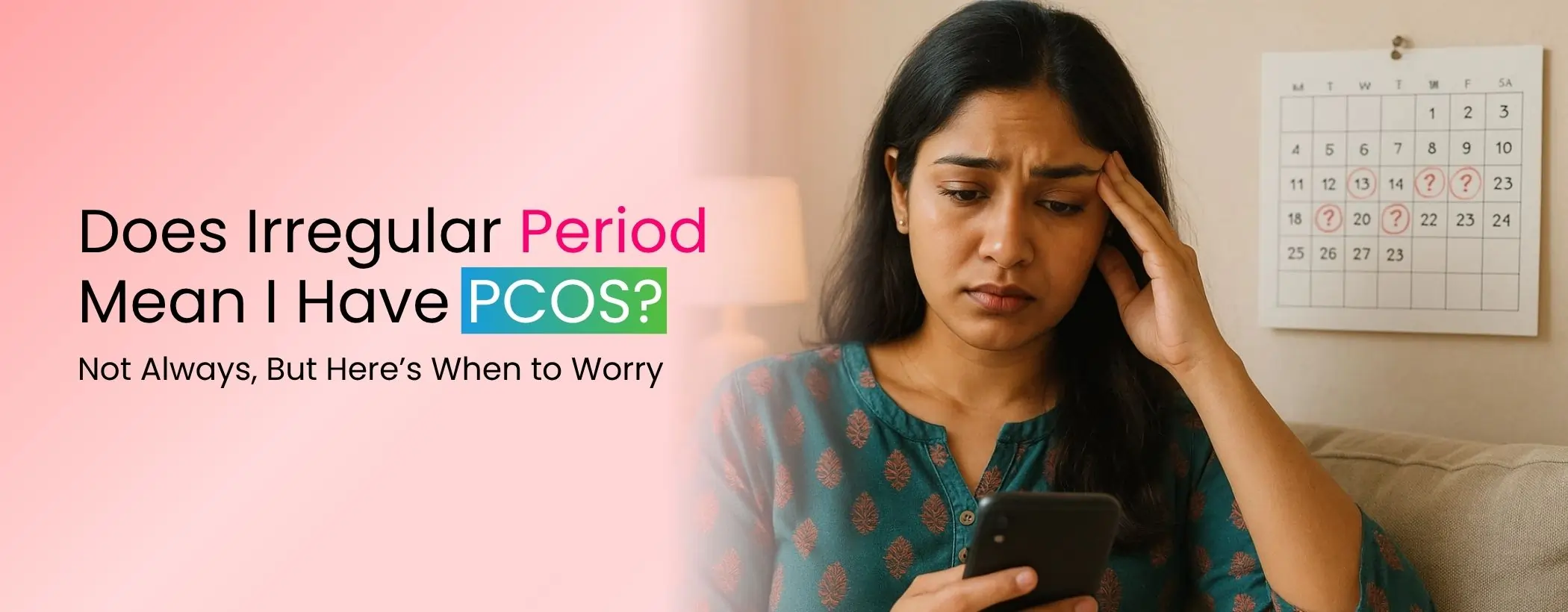
Does Irregular Period Mean I Have PCOS? Not Always, But Here’s When to Worry
We get it—you just opened your period tracking app, and the dates are all over the place again. Your cycle came early last month, late this month, or maybe skipped altogether. And now you’re Googling, "Do irregular periods mean I have PCOS?"
You're not alone. At Minnerva Clinic, we meet women every day who walk in with this very question, a bit anxious, a bit confused, and looking for real, non-judgmental answers. So this blog isn’t just a medical guide. It’s a heart-to-heart. Let's walk through this together.
What Counts as an Irregular Period, Really?
First, let’s clarify something: not every late period is a red flag. Life, stress, sleep, food, emotions—they all play a role in your cycle.
A regular period:
-
Comes every 24 to 38 days
-
May vary a little (like 2–5 days early or late)
-
Lasts between 4–7 days
If your periods come randomly, months apart, or last unusually long or short, it’s time to pay attention.
But remember: Irregularity isn’t a disease. It’s a symptom. Let’s understand what that symptom could be pointing to.
What Is PCOS Anyway?
PCOS (Polycystic Ovary Syndrome) is a hormonal condition where your ovaries produce too many androgens (male hormones), disrupting ovulation.
Common Signs of PCOS:
-
Irregular or absent periods
-
Excess facial/body hair (hirsutism)
-
Acne, especially on the jawline
-
Weight gain or difficulty losing weight
-
Thinning hair on scalp
-
Fertility struggles
You may also have multiple small cysts on your ovaries, but that’s not always necessary for a diagnosis.
Myth Breaker: Having irregular periods does NOT automatically mean you have PCOS.
Why Irregular Periods Happen (That Aren’t PCOS)
Let’s explore other common causes of irregular periods that often get mistaken for PCOS:
1. Stress
When your mind is on overdrive, your brain delays or disrupts ovulation.
2. Extreme Dieting or Over-Exercising
Your body may suppress ovulation when it senses you're undernourished or under physical stress.
3. Thyroid Disorders
Both hyperthyroidism and hypothyroidism affect menstrual regularity.
4. Sudden Weight Gain or Loss
Hormones are sensitive to body fat. Drastic changes can disrupt your cycle.
5. Medications or Birth Control Changes
Stopping/starting pills or emergency contraceptives can confuse your body for a while.
6. **Perimenopause (If You're 35+)
Your body begins shifting hormonal gears, and cycles may start to fluctuate.
When Irregular Periods Might Indicate PCOS
So when should you be concerned about PCOS? Here are some signs you should speak to a gynecologist:
-
Your cycles are consistently longer than 40 days or shorter than 21 days
-
Your periods come only 3–4 times a year
-
You’re gaining weight quickly despite eating healthy
-
You notice excessive facial hair or cystic acne
-
You’re trying to conceive but facing challenges
A doctor won’t diagnose you based on period dates alone. They’ll look at symptoms, hormone levels, ultrasound results, and your overall health picture.
How We Diagnose PCOS at Minnerva Clinic
At Minnerva, our female gynecologist knows how emotional these concerns can be. That’s why we keep our process warm, private, and easy to understand.
A PCOS workup may include:
-
Physical exam: to check weight, acne, hair growth
-
Pelvic ultrasound: to check your ovaries
-
Blood tests: to look at hormones like LH, FSH, insulin, and testosterone
It’s never just one test. And we never diagnose without listening to your story first.
What If It Is PCOS? Don’t Panic.
PCOS is common, treatable, and not the end of the world.
At Minnerva Clinic, we focus on long-term wellness, not just temporary fixes. Here’s what care might look like:
🌿 Lifestyle Changes First:
-
Balanced meals with fewer refined carbs
-
Daily movement (yoga, walks, not just the gym)
-
Mindful stress management
💊 Medications If Needed:
-
Birth control pills to regulate hormones
-
Metformin (if insulin resistance is involved)
-
Supplements like inositol or vitamin D (if tested low)
❤️ Emotional Support:
Many women with PCOS feel isolated or frustrated. We get that. That’s why our clinic offers you not just a doctor—but a listener, a guide, and sometimes a cheerleader.
You deserve to feel in control of your body, not confused by it.
When It’s Not PCOS: How We Still Support You
Sometimes, we rule out PCOS but still help you with:
-
Hormonal imbalance
-
PMS or PMDD
-
Thyroid support
-
Weight management
-
Period tracking guidance
No matter the cause, your body is giving you clues. We help you read them without fear.
Your Body Deserves Gentle Answers, Not Google Panic
It’s okay to be unsure. It’s okay to ask. And it’s completely okay to not have it all figured out.
That’s what Minnerva Clinic is here for.
If your periods are feeling off lately, don’t self-diagnose or feel embarrassed. We’ll help you understand what your body is trying to say — and how to support it in becoming its healthiest, most balanced self.
Book a Visit, Not Just a Test.
Because sometimes the most important diagnosis is reassurance.
Visit Minnerva Clinic today and talk to a gynecologist who listens like a sister, treats like a doctor, and supports like a friend.
